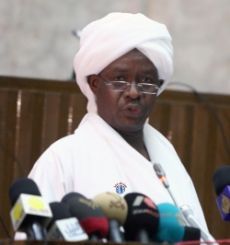Sudanese government to review immunity laws
September 4, 2013 (KHARTOUM) – The Sudanese government has acknowledged that the immunity rule enjoyed by government officials, MPs, as well as military, security and police personnel, undermined people’s faith in law and justice, affirming its intention to embark on a comprehensive review of the current laws.

He made the comments following a workshop on immunity laws held in Khartoum on Wednesday in order to closely examine all laws regulating immunity.
Dousa cautioned that immunity should be granted within very narrow limits and according to objective procedures, saying that immunity hampers the course of justice and delays the prosecution of lawbreakers.
The deputy speaker of the parliament, Samia Ahmed Mohamed, said that immunity have come to represent a real challenge for achieving justice, pointing out that the laws have overly expanded to the extent that people lost trust in enforcing justice.
She described immunity as a “virus” which weakens justice, saying it had lead to the creation of more wary and fearful communities.
Mohamed went on to say that the system of immunity was being abused both internally and internationally, calling for a major overhaul in order to avoid international claims that Sudan protects influential government officials against being subjected to the law.
She said the growing number of foreign nationals working for UN agencies or missions who enjoy diplomatic immunity, was also a matter of concern in light of what she said was the international new order’s animosity towards Sudan’s progressive cultural orientation.
On Monday, the opposition downplayed the impact of the workshop and said that recommendations provided by the ministry of justice will not be implemented due to structural problems in the nature of governance, emphasising that legal reform would only take place through a transitional period involving truth and reconciliation.
The head of the opposition Democratic Lawyers Alliance, Amin Mekki Medani, blasted the Sudanese judiciary, saying it is not impartial and turns a blind eye to violations committed by security forces against activists and opposition.
Medani recalled that perpetrators of crimes against innocent citizens in Port Sudan in 2005 and Kajbar in 2007, which led to the death of more than 30 people, have yet to be prosecuted.
The International Criminal Court (ICC) has issued arrest warrants for Sudanese president Omer Hassan Al-Bashir, his defence minister, Abdel-Rahim Mohamed Hussein, and the governor of North Kordofan, Ahmed Haroun, in connection with war crimes, crimes against humanity and genocide allegedly committed in Sudan’s western Darfur region.
The Sudanese opposition asserts that the ICC rulings are further evidence about the weakness of the local justice system.
In 2004, the UN Security Council (UNSC) formed a commission of inquiry headed by former president of the International Criminal Tribunal for the Former Yugoslavia (ICTY), Antonio Cassese, to look into Darfur abuses.
The commission concluded that Khartoum and government-sponsored Arab militias known as Janjaweed had engaged in “widespread and systematic” abuse that may constitute crimes against humanity.
They further said that Sudanese judiciary is “is unable or unwilling” to prosecute those crimes and thus recommended referring the situation to the ICC.
In a bid to deflect criticisms over Darfur and convince the UNSC to freeze proceedings against Bashir, Sudan has appointed several special prosecutors and established a number of special courts over the years. However, to date no high-profile prosecutions have taken place.
(ST)
